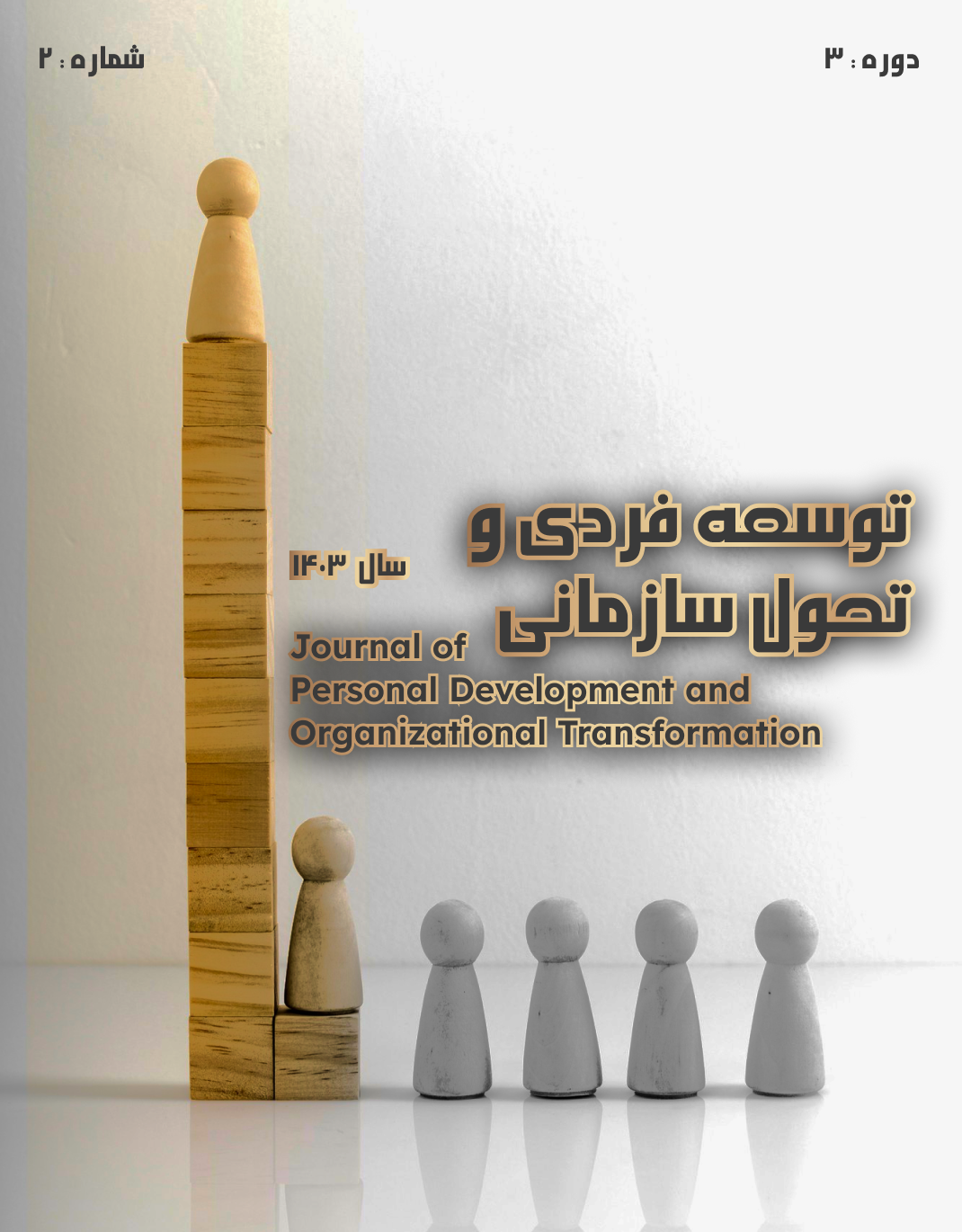Identifying Praise Management Factors Using a Textual Content Analysis Approach
Keywords:
praise management, government organizations, textual content analysisAbstract
This study aims to identify the key factors of praise management using a textual content analysis approach in order to develop a structured model for handling the phenomenon of flattery in governmental organizations. This is an applied, qualitative study conducted through textual content analysis. The research population included 31 Persian and 25 English-language academic articles related to management, organizational behavior, flattery, and impression management. Snowball sampling was employed, and data were collected through library research. The data were analyzed using MaxQDA software and coded into categories. Trustworthiness of the results was ensured using Holsti’s (2016) framework, which includes credibility, transferability, dependability, and confirmability. The findings revealed six major criteria and thirty sub-criteria associated with praise management. These criteria are: 1) utilitarianism/hedonism, 2) opportunistic behavior, 3) glass barrier, 4) interpersonal influence, 5) ingratiation and flattery, and 6) impression construction. Each of these dimensions encompasses behavioral and cognitive indicators that clarify how praise-related behavior can create managerial traps and distort decision-making processes within organizations. The study emphasizes that excessive praise, opportunism, and exaggerated self-presentation, if left unmanaged, may erode organizational performance and misguide leadership. It is essential to educate stakeholders, train ethical leaders, and implement control mechanisms to curb excessive praise and ensure sound governance in public sector management.
Downloads
References
Alotaibi, M. N. (2025). Participative Leadership as a Catalyst for Digital Transformation: Building Digital Organizational Culture and Identity. JoMW, 2025(2), 333-344. https://doi.org/10.53935/jomw.v2024i4.929
Firouzyar, S., & Kia Kojouri, D. (2013). Identification of Structural Restricting and Driving Factors of Development of Corporate Entrepreneurship (CE): A Case Study. Journal of Entrepreneurship and Innovation Management, 2(3), 1-16. https://dergipark.org.tr/tr/pub/jeim/issue/52619/692670
Haris, A., & Nuraeni, N. (2025). Adaptive Leadership in the Era of Disruption: Integrating Digital Transformation, Organizational Culture, and Teacher Performance (A Case Study of Muhammadiyah High Schools in Cianjur Regency). Dinasti International Journal of Education Management and Social Science, 6(2), 1649-1661. https://doi.org/10.38035/dijemss.v6i2.3961
Kiakojouri, D. (2024). Analysis of the relationships among Organizational Culture Indicators Using the DEMATEL Method at the Islamic Azad University in the West of Mazandaran Province. Journal of Dynamic Management Business Analysis, 2(4), 1-12. https://www.researchgate.net/publication/385082895_Analysis_of_the_relationships_among_Organizational_Culture_Indicators_Using_the_DEMATEL_Method_at_the_Islamic_Azad_University_in_the_West_of_Mazandaran_Province
Kumar, S. K. R. (2025). Influence of Sustainable Human Resource Practices on ITES Organizational Culture. Journal of Information Systems Engineering & Management, 10(13s), 522-530. https://doi.org/10.52783/jisem.v10i13s.2107
MirTaghian Rudsari, M., & Kiakojouri, D. (2016). Students' Attitudes to the Effectiveness of the Factors Affecting the Development of E-Learning (Case Study: Imam Khomeini Marine Science University in Nowshahr). Journal of Teaching in Marine Science, 3(5), 51-66. https://civilica.com/doc/665286/
Muralidhar, L. B., Lakshmi, K. V. N., Swapna, H. R., Rupani, J., Nethravathi, K., Pandey, B. K., & Pandey, D. (2024). Impact of Organizational Culture on The Level of Corporate Social Responsibility Investments: An Exploratory Study. Circular Economy and Sustainability. https://doi.org/10.1007/s43615-024-00371-9
Nishitha, K., & Kavitha, R. (2024). Exploring the Integration of Human Resource Management and Organizational Culture in Achieving Environmental Sustainability In Intersecting Human Resource Management and Organizational Culture for Environmental Sustainability. In (pp. 1-23). IGI Global. https://doi.org/10.4018/979-8-3693-2699-2.ch001
Orero-Blat, M., Leal‐Rodríguez, A. L., & Palacios-Marqués, D. (2024). The Strategic Advantage of Innovative Organizational Culture: An Exploratory Analysis in Digital Transformation and Big Data Analytics Capabilities. Journal of Management & Organization, 1-20. https://doi.org/10.1017/jmo.2024.74
Rahimi, B., Jahangirifar, M., & Hajalian, F. (2024). Designing a Model for Institutionalizing Organizational Culture Based on Synergy in the Parsian Hotel Group's Tourism Holding. Journal of Value Creation in Business Management, 2(4), 323-346. https://ensani.ir/fa/article/584317/
Renalwin, R. (2025). The Influence of Learning Organizational Culture, Employee Engagement, Digital Transformation, and Esg on Sustainable Competitive Advantage: The Role of Transformational Leadership at Abc University, Indonesia. International Journal of Social Science Humanity & Management Research, 04(03). https://doi.org/10.58806/ijsshmr.2025.v4i3n08
Rezaei, H. (2024). The role of organizational culture in the adoption of innovation and digital transformation in large companies. Personal Development and Organizational Transformation, 2(4).
Safi Khani, R., Pardakhtchi, M. H., Kavousy, E., & Ahmadi, G. (2024). A Model of Organizational Culture for Clinical Staff at the Ministry of Health, Treatment, and Medical Education. International Journal of Innovation Management and Organizational Behavior (IJIMOB). https://doi.org/10.61838/
Saharui, F. M. L., Bogar, W., & Mokat, J. (2024). The Influence of Servant Leadership and Organizational Culture on Employee Performance at ODSK Regional General Hospital in North Sulawesi. Technium Social Sciences Journal, 63, 313-322. https://doi.org/10.47577/tssj.v63i1.11951
Sajadi, S., Kiakojouri, D., & Hatami, G. (2012). The Relationship Between Anxiety and Difficulties in Emotion Regulation with General Health and Psychological Hardiness in Students of Islamic Azad University. Indian Journal of Fundamental and Applied Life Sciences, 2(3), 117-125. https://www.cibtech.org/J-LIFE-SCIENCES/PUBLICATIONS/2012/Vol%202_No._3/17-014...Sajadi...The...Relationship...Tonekabon.pdf
Vatan, E., Raissi Ardali, G. A., & Shahin, A. (2024). Selecting information systems development models based on organizational culture: an integrated approach of DEMATEL and ANP. VINE Journal of Information and Knowledge Management Systems, 54(3), 531-560. https://doi.org/10.1108/VJIKMS-08-2021-0164
Velyako, V., & Musa, S. (2024). The relationship between digital organizational culture, digital capability, digital innovation, organizational resilience, and competitive advantage. Journal of the Knowledge Economy, 15(3), 11956-11975. https://doi.org/10.1007/s13132-023-01575-4
Widodo, S. D., Winarno, A., Saragih, R., & Puspitasari, D. (2024). The Influence of Digital Leadership and Organizational Culture on Employee Performance: The Mediating Role of Digital Transformation. International Journal of Economics Business and Management Research, 08(09), 272-287. https://doi.org/10.51505/ijebmr.2024.8916
Winata, L. R. W. (2024). The Influence of Organizational Culture, Situational Leadership and Emotional Intelligence on Organizational Commitment Through Job Satisfaction at PDAM Tirta Ardhia Rinjani, Central Lombok Regency. Journal of Economics Finance and Management Studies, 07(05). https://doi.org/10.47191/jefms/v7-i5-17
Zhdanova, P. R. (2024). Attributes of Organizational Culture as Predictors of Employee Burnout: A Brief Review. Journal of Modern Foreign Psychology, 13(3), 83-92. https://doi.org/10.17759/jmfp.2024130308
Downloads
Published
Submitted
Revised
Accepted
Issue
Section
License
Copyright (c) 2025 امید فاتحی جیفرودی (نویسنده); رضا وریج کاظمی; اعظم حاجی آقاجانی, جواد گیلانی پور (نویسنده)

This work is licensed under a Creative Commons Attribution-NonCommercial 4.0 International License.







